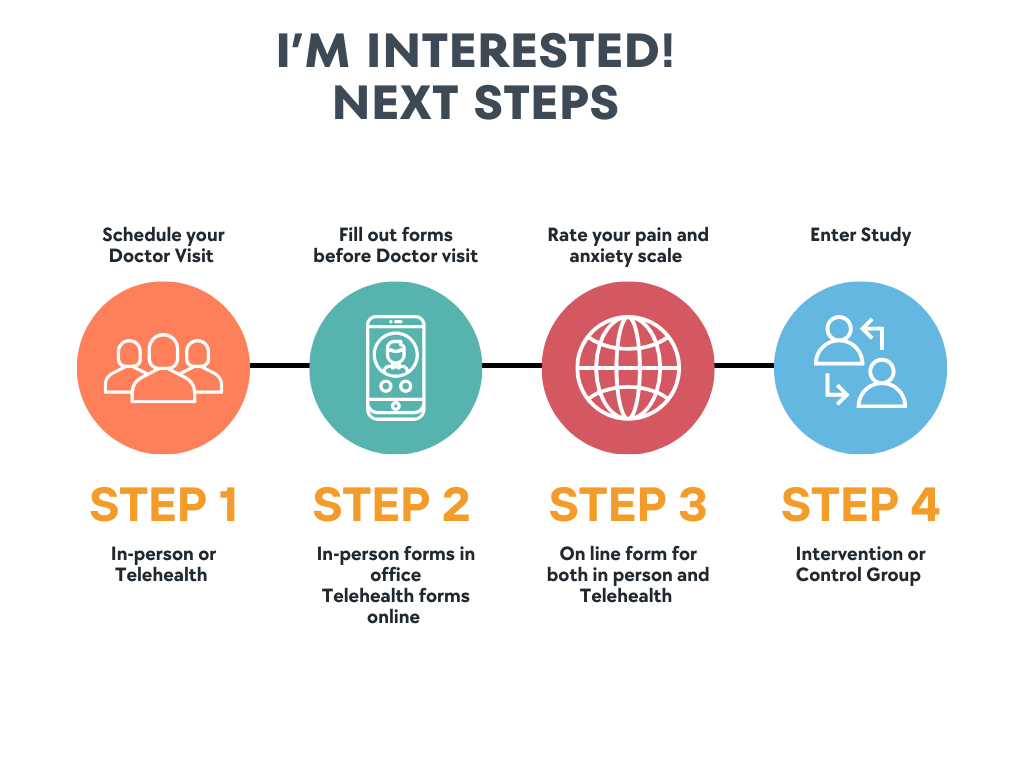
Intercessory Prayer Study
Study Enrollment Closed
Thank you for your interest in our study. We have reached the required number of participants and are no longer accepting new candidates at this time. We sincerely appreciate your willingness to participate and support our research.
Thank you again for your interest and support!
The purpose of this study is to understand the effects of Christian prayer on pain and anxiety. We want to find out if receiving prayer for healing can help reduce pain and anxiety.
There is an in person option called Proximal Intercessory Prayer(PIP) or Telehealth option called Virtual Intercessory Prayer(VIP).
What’s in it for me?
If you choose to participate:
1. You will receive Additional Spiritual Care
2. You may experience alleviation of your symptoms of pain and /or anxiety.
3. You will receive Amazon gift cards: $15 today, $20 after you complete the first follow-up survey, and $30 after you complete the final survey.
What should I expect during a time of Proximal Intercessory Prayer(PIP)?
If you are offered the prayer intervention, a prayer practitioner will pray with you in person for 5-10 minutes. They will ask God to heal your pain and/or anxiety and may offer related prayers for your well-being. The prayer practitioner may also address disease and affliction directly and command it to leave your body. The prayer practitioner may ask your permission to place hands on you while praying. You may decline to have hands placed on you during the prayer intervention while still participating in the study. You will not need to do anything other than wait while you are prayed for.
What should I expect during a time of Virtual Intercessory Prayer(VIP)?
If you are offered the prayer intervention, a prayer practitioner will pray with you online for 5-10 minutes. They will ask God to heal your pain and/or anxiety and may offer related prayers for your well-being. The prayer practitioner may also address disease and affliction directly and command it to leave your body. You will not need to do anything other than wait while you are prayed for.
Prayer has been shown to improve Wellness*
* Positive outcomes may be reviewed in the following medical research studies:
Matthews DA, Marlowe SM, MacNutt FS. Effects of intercessory prayer on patients with rheumatoid arthritis. South Med J 2000;93:1177–1186.
Brown CG, Mory SC, Williams R, McClymond MJ. Study of the therapeutic effects of proximal intercessory prayer (STEPP) on auditory and visual impairments in Rural Mozambique. South Med J. 2010;103(9):864–869. https://doi.org/10.1097/SMJ.0b013e3181e73fea.
Romez, C., Zaritzky, D & Brown, J. W. (2019). Case Report of gastroparesis healing: 16 years of a chronic syndrome resolved after proximal intercessory prayer. Contemporary Therapies in Medicine. 43, 289-294. https://doi.org/10.1016/j.ctim.2019.03.004
STUDY PROCEDURES
We will randomly assign you to one of two groups.
Group One:Intervention
If you are assigned to the intervention group, you will receive prayer immediately following your scheduled visit with your provider. Intervention for the telemedicine group will receive prayer during available online hours.
Group TWO:Control
The second group will rest in a room for 5 minutes following the regular medical care you are receiving at the office visit or Telehealth visit(Control group)
Surveys
Regardless of group, you will be asked to complete survey’s regarding your medical history, your background, and any symptoms you may have of pain and anxiety.
Complete survey after the first PIP/ VIP
Complete survey 2-4 weeks after the PIP/VIP
Complete survey 6-8 weeks after the PIP/VIP.
Next steps
If I choose to participate what will I need to do?
To start, you must be a current patient of the University of Maryland Family Medicine practice. Next, we’ll need to ask a few questions to determine if you are eligible for the study. This study includes a single session on the day of your scheduled doctors appointment in the office or through Telehealth as part of either our intervention or control group, which will take about 5-15 minutes of your time.
The entire study participation is designed to be brief, totaling 30-45 minutes over 8 weeks.
RISKS:
You may feel uncomfortable about participating in a spiritual practice.
You may feel uncomfortable answering questions about your levels of pain and/or anxiety, and about your personal spiritual experiences.






